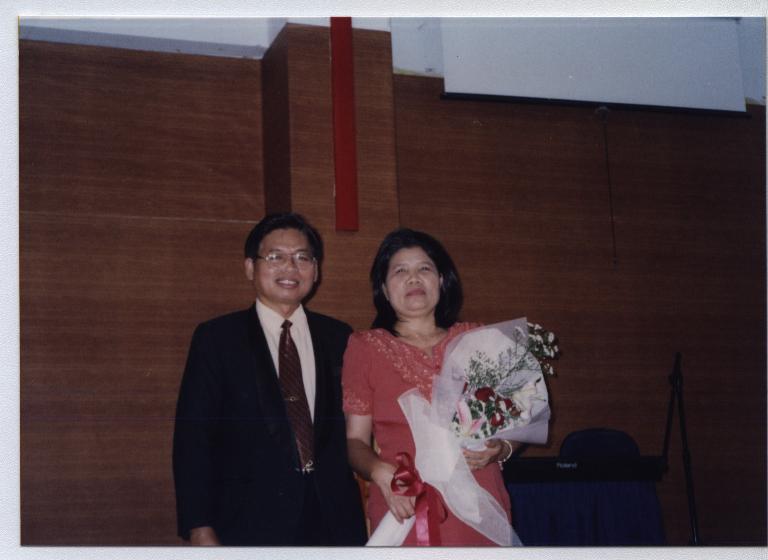RESEARCH PAPER
EARLY CHURCH HISTORY ON ST.AUGUSTINE
BY
DEAN SHINAVER
ON
NOVEMBER 01, 2009
THIS RESEARCH PAPER IS A REQUIREMENT OF EARLY CHURCH HISTORY COURSE (TH 6300A)OF DR. JOEL WILLIAM STEPHEN TO FULLFILL A MASTER DGREE IN DIVINITY AT AMRIDGE UNIVERSITY, FALL 2009
CONTENTS
INTRODUCTION 3
THE EARLY LIFE OF AUGUSTINE 4
THE TEACHING OF AUGUSTINE 5
SUMMARY 10
BIBLIOGRAPHY 11
INTRODUCTION
Augustine has a remarkable career. He is a latin church father. He is one of the most
important figures in the development of Western Christianity. Augustine thinks of the
church as a "strong woman". In this term paper we will learn about Augustine early life,
time he converted to Christ. Including his confessions of 13 books and his teaching to the
world. He framed the concepts of original sin and just war.
During his youth, Augustine had studied rhetoric at Carthage, a discipline that he used to
gain employment teaching in Carthage and then in Rome and Milan, where he met
Ambrose who is credited with effecting Augustine's conversion and who baptized
Augustine in 387.
I. The early life of Augustine
"Augustine is know as St. Augustine was a Berber philosopher and theologian. He was bron in November 13, 354 in the city of Thagaste a provincial Roman city in North. He is a Latin church father. He is one of the most important person in the development of Western Christianity."[1] When he was 11 years old, Augustine went to school at Madaurus. There he became familiar with Latin Literature, as well as pagan beliefs and practices. When he was 17 years old, he wewnt to Carthage to continue his studying in rhetoric. He was raised as a Catholic as his mother was a Berber who devout to Catholic and his father was a decurio, a minor official of the Roman empire. Augustine had at least one brother, Navigius, and at least one sister. He has a relationship with a young woman in Carthage and she gave birth a son named Adeodatus. "Augustine developed the concept of the Church as a spiritual City of God. He converted to Christianity and became a bishop. He believes that people can have the ability to choose to be good to such a degree as to merit salvation without divine aid."[2] Augustine is often viewed as the central figure in the movement from "antiquity" to the Middle Ages. Among the Orthodox he is called Blessed Augustine, or St. Augustine the Blessed. The years of 373 and 374 he taught grammar at Thagaste. In late 384 he headed north. When he was thirty he won the most visible academic chair in the Laine world. During this time Augustine was a devout follower of Manichaeism. In Rome, he embraced the skepticism of the New Academy movement. "In A.D 386, Augustine faces the personal crisis that lead him to convert to Christianity. He left his career in rhetoric and devote himself to serve God and to the practices of priesthood. The key to Augustine conversion was a childlike voice he heard in a sing song voice, tolle, lege which means take up and read."[3] After he head the voice. He paused to give thought to how and why such a child would sing those words and then left his garden and returned to his house. At his house he picked up a book written by the Apostle and opened it and instantly read : (Romans 13: 13-14. In his confessions has more detail on his spiritual jorney which became a classice of both Christian theology and world literature.
II. The Teaching of Augustine 1. The teaching of Augustine. "Neo-Platonic philosophy was the field of exercise for the mind of Augustine previous to his conversion, and it was the same philosophy, which prepared him for conversion. Augustine accepts that the one who grants or imparts these intelligible notions to the soul is God, the Truth of God, the Word of God, to who are transferred all Platonic Ideas."[4] In the Word of god exist the eternal truths, the species, the formal principles of things, which are the models. In the intellectual light imparted to us by the Word of God we know both the eternal truths and the ideas of real beings. Augustine as the science for considers philosophy the solution of the problem of life; Augustine thought focus on God and the soul, and the problem of evil. We must be solved in order that one may know the nature of the soul. "Augustine teaches about freewill and he tries to reconcile his beliefs about freewill, especially the belief that humans are morally responsible for their actions, with his belief that one's life is predestined."[5] "Philosophy of St. Augustine is the love of wisdom, that is to say, the love of God. And this God, whom philosophy teaches us to love, is the Holy Trinity as taught in the Christian faith. The teachings of St. Augustine have God as its center. His metaphysics, his ethics, and above all his psychology, converge steadily to the study of God. And his study of God is permeated through and through by the closest blending of intellectualism and mysticism. We must seek the truth, not only to know it, but also to love it."[6] 2. The confession of Augustine "The Confessions is the story of a conversion. This conversion took place in the garden; a conversion that took place from the time he read Cicero at age eighteen; a conversion that took place across his whole life."[7] Augustine hopes to teach others about that love which God placed in him that led him to an eternal relationship with God. All of Augustine's loves in turn became love of Christ. "Augustine found a place in God that he had never imagined could happen. His guilty restless heart finally found rest in God. Love played a significant role in this conversion. Augustine later recognized this as God's truth and word, by which God had made all things."[8] This wisdom came into the world as Christ. Augustine once had finally found peace and rest in God. It helped guide him towards God and Christ in a positive way that it influenced the rest of his life. These are 13 confession book of Augustine. 2.1 The first book: Confessions of the greatness and God's mercies in infancy and boyhood, and human willfulness; of his own sins of idleness, abuse of his studies, and of God's gifts up to his fifteenth year. 2.2 The second book: Object of these Confessions. Further ills of idleness developed in his sixteenth year. Evils of ill society, which betrayed him into theft. 2.3 The third book: His residence at Carthage from his seventeenth to his nineteenth year. Source of his disorders. Love of shows. Advance in studies, and love of wisdom. Distaste for Scripture. Led astray to the Manichæans. Refutation of some of their tenets. Grief of his mother Monnica at his heresy, and prayers for his conversion. Her vision from God, and answer through a Bishop. 2.4 "The fourth book: Augustine's life from nineteen to eight-and-twenty; From ages 19
to 28, Augustine is a teacher of rhetoric and an adherent of Manichaeism, both false
occupations. During this time, he lives with a woman and has a child by her. He is
faithful to her, although their relationship was based on sex, not on friendship. He
despises soothsayers, but he continues to consult astrologers and to practice astrology
himself, despite the advice of a wise friend that astrology is phony."[9] 2.5 The firth book: St. Augustine's twenty-ninth year. Faustus, a snare of Satan to many, made an instrument of deliverance to St. Augustine, by showing the ignorance of the Manichees on those things wherein they professed to have divine knowledge. Augustine gives up all thought of going further among the Manichees: is guided to Rome and Milan, where he hears St. Ambrose, leaves the Manichees, and becomes again a Catechumen in the Church Catholic. 2.6 "The sixth book: Arrival of Monnica at Milan; her obedience to St. Ambrose, and his value for her; St. Ambrose's habits; Augustine's gradual abandonment of error; finds that he has blamed the Church Catholic wrongly; desire of absolute certainty, but struck with the contrary analogy of God's natural Providence; how shaken in his worldly pursuits; God's guidance of his friend Alypius; Augustine debates with himself and his friends about their mode of life; his inveterate sins, and dread of judgment."[10] 2.7 The seventh book: Augustine describes his attempts to think about the nature of God.
He still conceives of God as a kind of matter, like air or water, filling the spaces of the
universe. 2.8 The eighth book: Augustine's thirty-second year. He consults Simplicianus: from him hears the history of the conversion of Victorinus, and longs to devote himself entirely to God, but is mastered by his old habits; is still further roused by the history of St. Antony, and the conversion of two courtiers; during a severe struggle hears a voice from heaven, opens Scripture, and is converted, with his friend Alypius. His mother's vision fulfilled. 2.9 The ninth book: Augustine determines to devote his life to God, and to abandon his profession of Rhetoric, quietly however; retires to the country to prepare himself to receive the grace of Baptism, and is baptised with Alypius, and his son Adeodatus. At Ostia, in his way to Africa, his mother Monnica dies, in her fifty-sixth year, the thirty- third of Augustine. Her life and character. 2.10 The tenth book: Having in the former books spoken of himself before his receiving the grace of Baptism, in this Augustine confesses what he then was. But first, he enquires by what faculty we can know God at all, whence he enlarges on the mysterious character of the memory, wherein God, being made known, dwells, but which could not discover Him. Then he examines his own trials under the triple division of temptation, "lust of the flesh, lust of the eyes, and pride"; what Christian contingency prescribes as to each. On Christ the Only Mediator, who heals and will heal all infirmities. 2.11 "The eleventh book: Augustine considers the meaning of the first words of Genesis:
"In the beginning, God created heaven and earth." Augustine asks how he can know that
this is true. It is obvious that all things were created, because they are subject to change.
God created them through the Word, Jesus Christ."[11]
2.12 "The twelvth book: Augustine examines the second verse of Genesis: "The earth
was invisible and formless, darkness was over the deep." He says that "heaven" does not
mean the sky, but the immaterial "heaven of heavens," and "earth" does not mean the
ground, but the formless matter that is the basis of all physical forms. Augustine imagines
opponents who disagree with his interpretation."[12]
2.13 "The thirteenth book: All of creation depends on God's goodness, and God chose to
create because of the abundance of his goodness. Augustine examines the action of the
Holy Trinity in the creation by looking at the verse "the Spirit moved over the waters."
Just as a human has being, knowledge, and will but is one person, so the Holy Trinity has
those qualities but is one God."[13] III. Summary St. Augustine affirms that the world was created by God from nothing, through a free act of His will. The primary among these three faculties is given to the will, which in man signifies love. The will of man is free. "Three kinds of evil can be distinguished: metaphysical, physical, and moral. Metaphysical evil is the lack of , all creatures are evil because they fall short of full perfection, which is God alone. Physical evil consists in the privation of a perfection due to nature. The only true evil is moral evil; sin, an action contrary to the will of God. The cause of moral evil is the faculty of free will. Sin, from the very fact it is decadence of being, carries in itself its own punishment."[14] But on the other hand, there are truths that reason would not even suspect if God had not proposed them for our belief. St. Augustine's philosophy follows, step by step. Faith renders service to reason, just as reason does to faith. Reason furnishes us with the concepts that are at the root of what we are to believe: it establishes the existence and infallibility of revelation. From the facts themselves of his life, it is apparent that the Doctor of Hippo had to pass through many stages before he reached the full and complete development of his philosophical ideas. "Augustine lived from 345 to 430. He spent most of his time in north Africa. His chief contribution to philosophy was probably to link Plato's ideas with those of Christianity. He believed that both philosophy and religion were aimed at living the happy or blessed life. His most famous work is The City of God."[15] BIBLIOGRAPHY
Augustine, Saint. St. Augustine Confessions. CreateSpace, October 2009
Augustine, Hal McElwaine Helms. The confessions of St. Augustine. Paraclete Pr. 1986
Augustine, St. Saint of Hippo Augustine. The Rhetoric of St. Augustine of Hippo (De Doctrina Christiana & the Search for a Distinctly Christian Rhetoric) (Studies in Rhetoric Religion), Baylor University Pr,., 2008
Augustine, Saint of Hippo Augustine. Confessions of St. Augustine. Fleming H Revell Co,. 2008
Augustine J. Campbell. The Confessions of St. Augustine: Selections from Books I-IX. Bolchazy-Carducci Publishers, June 1984
Beth Rogero Bowen, St. Augustine Historical Society. St. Augustine in the Gilded Age. Arcadia Publisher, 2008
Carl G. Vaught. Encounters With God in Augustine's Confessions: Books VII-IX. Albany, N.Y State University of New York Press, 2004.
Henry Chadwick. Augustine: A very short Introduction. Oxford University Press, USA, June 2001
John Mark Mattox. St. Augustine and the theory of Just war. Continuum Intl Pub Group, 2008
John von Heyking Augustine and Politics As Longing in the World. Eric Voegelin Institute Series in Political Philosophy. aColumbia, MO University of Missouri Press, 2001.
Maggie Hall. St. Augustine. Arcadia Publisher, 2008
Michael Hanby Augustine and Modernity. Radical Orthodoxy Series. New York Taylor & Francis, 2003.
Summer Bozeman. St. Augustine. Arcadia Publisher, 2009
[1] Beth Rogero Bowen, St. Augustine Historical Society. St. Augustine in the Gilded Age. Arcadia Publisher, 2008 [2] Augustine, Saint of Hippo Augustine. Confessions of St. Augustine. Fleming H Revell Co,. 2008 [3] Henry Chadwick. Augustine: A very short Introduction. Oxford University Press, USA, June 2001 [4] Augustine, St. Saint of Hippo Augustine. The Rhetoric of St. Augustine of Hippo (De Doctrina Christiana & the Search for a Distinctly Christian Rhetoric) (Studies in Rhetoric Religion), Baylor University Pr,., 2008 [5] Michael Hanby Augustine and Modernity. Radical Orthodoxy Series. New York Taylor & Francis, 2003. [6] John Mark Mattox. St. Augustine and the theory of Just war. Continuum Intl Pub Group, 2008 [7] Augustine, Saint. St. Augustine Confessions. CreateSpace, October 2009
[8] Augustine, Hal McElwaine Helms. The confessions of St. Augustine. Paraclete Pr. 1986 [9] Maggie Hall. St. Augustine. Arcadia Publisher, 2008 [10] W.H.C. Frend. The rise of Christianity. Fortress press, Philadelphia, 1984 [11] Paul Strathern. St. Augustine. Blackston Audio Inc. 2008 [12] Augustine J. Campbell. The Confessions of St. Augustine: Selections from Books I-IX. Bolchazy-Carducci Publishers, June 1984 [13] Summer Bozeman. St. Augustine. Arcadia Publisher, 2009 [14] Carl G. Vaught. Encounters With God in Augustine's Confessions: Books VII-IX. Albany, N.Y State University of New York Press, 2004. [15] John von Heyking Augustine and Politics As Longing in the World. Eric Voegelin Institute Series in Political Philosophy. aColumbia, MO University of Missouri Press, 2001. |












































